Former top inspector of the Iraqi ministry of agriculture said the current troubles which oppressing powers like 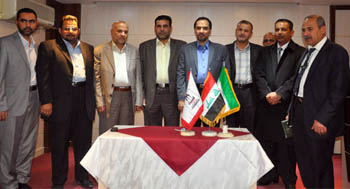 the Zionist regime are creating for the Islamic Republic of Iran is not a new thing and they have tried this since the beginning of the revolution.
the Zionist regime are creating for the Islamic Republic of Iran is not a new thing and they have tried this since the beginning of the revolution.
Mohsen Mousavi made the remarks during a meeting of a delegation of Iraqi officials, scholars and university professors with Seyyed Mohammad Javad Hasheminejad Secretary General of Habilian Association in Mashhad.
Seyyed Mohammad Javad Hasheminejad started the meeting with a brief on the recent developments in the region and awakening of the Islamic nations.
Referring to the colonial role of western governments during the past decades, he said: “Whenever the front opposing oppressive powers has been comprised of governments that enjoy little or no support from their people, the result has been nothing but a total failure for them. But, where the nations have confronted the colonizers, success has been achieved and the enemy heavily defeated.”
Mr.Hasheminejad pointed out the close and historic relationship between the two Iranian and Iraqi nations and expressed: “The two nations have long been in contact so the enemies have tried to separate them. But we can see although the ties between them had been practically cut for 40 years, the two nations welcomed each other after the fall of Saddam’s Ba’ath regime.”
Habilian SG also pointed out the western governments’ aim, specifically the U.S. government’s, to create separations between the nations in the region including Iran and Iraq and said: “The U.S. needs mercenary terrorist groups such as the Mujahedin e-Khaql organization. When the U.S Army occupied Iraq, it lacked the knowledge on Iraqi tribes and groups, so the MEK which had long stayed in Iraq, was used by the U.S Army for terrorist operations and training other terrorist groups.
Appreciating Habilian Secretary General for his beneficial details on terrorist MEK and U.S. colonial plans in the region, Seyyed Saber al-Hosseini, the head of Iraqi center for strategic studies, highlighted some activities of his center and said: “The center for Strategic Studies of Iraq has executed very good plans to reveal MEK’s crimes inside and outside Iraq. These activities include Satellite TV programs and brochures in Iraqi universities. Mobilizing people and rallying towards MEK camps has been another activity we have done several times during the past recent years.
He reiterated: “The terrorist MEK had a major role in suppression of the honorable Iranian nation and also the Iraqi nation at the Sha’abanieh Intifada as the Saddam’s striking arm. “
The Iraqi scholar referred to the problems on the way to expel the MEK and said: “You are aware the Iraqi administration is not all united and this is the reason of some problems created. Some people are after returning Iraq to the Saddam era.”
In another part of his speech, Saber al-Hosseini said: “We hope Habilian Association has a good connection to the institutes working in Iraq on terrorism. The two nations’ martyrs have had common goals which could be the interface between the nations. About 250 thousand of the Iraqi people were martyred by Saddam regime because they didn’t take part in the war against Iran. This shows Iraqi people were not willing for this war to take place.”
Mohsen Mousavi, former top investigator of Iraqi ministry of agriculture, pointed out the victory of Iranian Islamic revolution led by Imam Khomeini and the struggles in the beginning of the revolution which shed light on the nature of different groups and also the efforts from oppressing powers including the Zionist regime against Islamic Republic and said: “The current troubles these powers are creating for the Islamic Republic of Iran is not a new thing and they have tried this since the beginning of the revolution. What has changed, is the direct presence of U.S. and Israel in the region. The result of this presence is that we can see numerous terrorist groups supported by western powers.
Referring to MEK’s status in Iraq he said: “The MEK is all surrounded and its activities are watched. They can’t do anything in Iraq, but unfortunately there are other political movements and parties in Iraq which are after destabilizing the country with the support of the U.S. and Israel. Financial support of these groups is continuous and not limited. Unfortunately, this is harmful for some popular political groups that are seeking new fields of activity. These terrorist acts hinder their activities.”
Former top investigator of Iraqi ministry of agriculture described the ties between the two nations as inseparable and said: “Naturally, these terrorist groups’ activities are an effort to cut the ties between the Islamic republic of Iran and government of Iraq. The U.S. failure in Iraq has been one of the reasons for harsh economic blockade against the Islamic Republic. “
At the end, Mousavi said: “Number of people killed after Saddam’s fall in Iraq is way more than number of the people killed before and even during the Saddam era. We hope a certain framework is created between us. Not only for the MEK threat, but also for opposing any common threats the both nations are facing in the region.”
At the end of the meeting, Seyyed Mohammad Javad Hasheminejad referred to the various aspects of MEK’s presence in the region and their destructive role and said: “Two issues must be addressed about the MEK. First of all they are still in the region and surrounded. But this is not all the problem. According to our Iraqi friends, there are several people in the Iraqi administration and Parliament who support them. Several Iraqi newspapers have taken money from them, so they also support the MEK. This is their destructive role. Unarmed MEK is far more dangerous than armed MEK.”
Hasheminejad continued: “The MEK is now seeking to destroy nations by highlighting their differences instead of just assassinating people. Anything leading to increment of tensions between the two countries is welcomed by them and this is the very destructive role of the MEK and one of the reasons why the U.S. is trying hard to keep them in Iraq. Another reason for the U.S. to try to keep the terrorist group in Iraq is to stop the MEK members from entering the United States. They are also well aware how dangerous these people can be.”
The MEK as crisis mongers
Terrorist organizations are in the job of doing terror. In recent years they have been inside Iran conducting 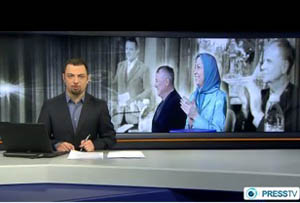 terrorist activities, bombing up places. The fact that they are Iranians, the fact that their native language is Persian means that they can move in and out of Iran a lot easier than anyone else could and so this would be a continuation of (the United States) using them inside Iran to kill people and blow up buildings.”
terrorist activities, bombing up places. The fact that they are Iranians, the fact that their native language is Persian means that they can move in and out of Iran a lot easier than anyone else could and so this would be a continuation of (the United States) using them inside Iran to kill people and blow up buildings.”
An analyst says the recent US, MKO meeting signifies that Washington is trying to use the organization for killings and bombings inside Iran as acts of terrorism are what terrorist groups typically do.
The comment comes as a bipartisan group of US congress members has met with the anti-Iran terrorist group Mujahedin-e Khalq Organization (MKO) in France.
The congressional team led by Dana Rohrabacher, a California Republican, met the MKO terrorists in Paris on Sunday and expressed strong support for the group.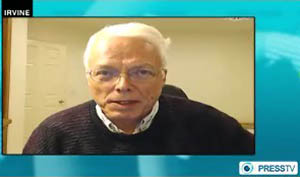
The MKO is listed as a terrorist organization by much of the international community.
On September 28, the terrorist group was taken off the US State Department’s terrorism blacklist a week after US Secretary of State Hillary Clinton sent the US Congress a classified memo about the move.
Press TV has conducted an interview with Professor of California State University Paul Sheldon Foote to further discuss the issue. What follows is an approximate transcription of the interview.
Press TV: Sir welcome to the program. Well the MKO is well-known for carrying out a long list of terror acts. How do you see the sequence of events that led to Europe and the United States delisting the MKO from their list of terrorist organizations and also about the timing of this meeting in France?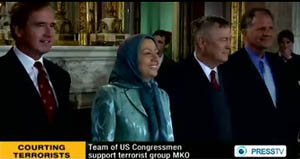
Foote: The problem America has had for very many years is that the Iraqi government has said you say we are a free country now well why do we have to keep Iranian communists, free terrorists in our land and there have been frequent action for some of the Mujahidin cult terrorists have been killed by Iraqi troops.
So America keeps trying. It’s a real shame that Dana Rohrabacher who claims to be a Republican from Southern California is continued being reelected. It shows you how stupid Republican voters are when you have Republicans supporting communist terrorists.
Press TV: And what do you think the United States has in mind next for the MKO?
Foote: Terrorist organizations are in the job of doing terror. In recent years they have been inside Iran conducting terrorist activities, bombing up places. The fact that they are Iranians, the fact that their native language is Persian means that they can move in and out of Iran a lot easier than anyone else could and so this would be a continuation of using them inside Iran to kill people and blow up buildings.
Iraqi officials announced that a number of al-Qaeda operatives have been trained in the main training camp of the terrorist Mojahedin-e Khalq Organization in Iraq’s Diyala province (Camp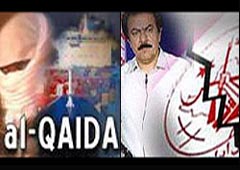 Ashraf) to carry out terrorist attacks against the Iraqi people.
Ashraf) to carry out terrorist attacks against the Iraqi people.
"When the MKO elements were still in Camp Ashraf, the al-Qaeda forces were trained in there and the camp had turned into a center for terrorism and killing," Head of the Security Committee of Diyala province Meysam al-Tamimi said.
According to Ashrafnews, Tamimi also said that the Iraqi security forces have found a secret cache of heavy weaponries in the Camp, adding that the MKO had been training the al-Qaeda members how to use these weaponries.
He said that the al-Qaeda members were trained to conduct terrorist operations in the province specially to force the people residing around Camp Ashraf to leave the area.
The mass graves which have recently been unearthed near the main training camp of the terrorist MKO in Iraq’s Diyala province also unveiled a strong bond between the MKO and the Al Qaeda terrorist group.
Speaking to FNA on Sunday, Udai al-Khadran, the governor of the city of Khalis in Diyala province, said Al Qadea and the MKO members cooperated to intensify unrests in Khalis.
He added that the MKO members are involved in Al Qaeda bombing plots and kidnappings in Diyala.
Khadran added that there exist documents substantiating that some Iraqi officials are collaborating with terrorists and have taken bribes to the very same end.
Earlier in January, an Iraqi official said several mass graves have been unearthed in Camp New Iraq, formerly known as Camp Ashraf, in Iraq’s Diyala Province, which was the headquarters of the terrorist MKO.
Sadeq al-Husseini, the deputy chairman of Diyala’s provincial council said that the Iraqi Ministry of Human Rights was in charge of determining the identities of the bodies and whether they were Kurds, the residents of southern provinces or from the town of Khalis in Diyala Province.
He said that the bodies were being examined in medical laboratories in Arbil Province, adding that human rights violations in the camp did not seem improbable.
The MKO is behind a slew of assassinations and bombings inside Iran, a number of EU parliamentarians said in a recent letter in which they slammed a British court decision to remove the MKO from the British terror list. The EU officials also added that the group has no public support within Iran because of their role in helping Saddam Hussein in the Iraqi imposed war on Iran (1980-1988).
Many of the MKO members abandoned the terrorist organization while most of those still remaining in the grouplet are said to be willing to quit but are under pressure and torture not to do so.
A May 2005 Human Rights Watch report accused the MKO of running prison camps in Iraq and committing human rights violations.
According to the Human Rights Watch report, the outlawed group puts defectors under torture and jail terms.
The group, founded in the 1960s, blended elements of Islamism and Stalinism and participated in the overthrow of the US-backed Shah of Iran in 1979. Ahead of the revolution, the MKO conducted attacks and assassinations against both Iranian and Western targets.
The group started assassination of the citizens and officials after the revolution in a bid to take control of the newly established Islamic Republic. It killed several of Iran’s new leaders in the early years after the revolution, including the then President, Mohammad Ali Rajayee, Prime Minister, Mohammad Javad Bahonar and the Judiciary Chief, Mohammad Hossein Beheshti who were killed in bomb attacks by MKO members in 1981.
The group fled to Iraq in 1986, where it was protected by Saddam Hussein and where it helped the Iraqi dictator suppress Shiite and Kurd uprisings in the country.
The terrorist group joined Saddam’s army during the Iraqi imposed war on Iran (1980-1988) and helped Saddam and killed thousands of Iranian civilians and soldiers during the US-backed Iraqi imposed war on Iran.
Since the 2003 US invasion of Iraq, the group, which now adheres to a pro-free-market philosophy, has been strongly backed by neo-conservatives in the United States, who argued for the MKO to be taken off the US terror list.
The US formally removed the MKO from its list of terror organizations in early September, one week after Secretary of State Hillary Clinton sent the US Congress a classified communication about the move. The decision made by Clinton enabled the group to have its assets under US jurisdiction unfrozen and do business with American entities, the State Department said in a statement at the time.
The mass graves which have recently been unearthed near the main training camp of the terrorist Mojahedin-e Khalq Organization in Iraq’s Diyala province unveiled a strong bond between the MKO and the Al Qaeda terrorist group. 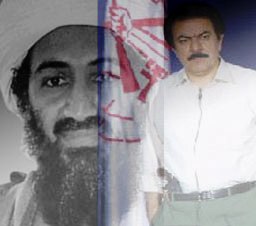
Speaking to FNA on Sunday, Udai al-Khadran, the governor of the city of Khalis in Diyala province, said Al Qadea and the MKO members cooperated to intensify unrests in Khalis.
He added that the MKO members are involved in Al Qaeda bombing plots and kidnappings in Diyala.
Khadran added that there exist documents substantiating that some Iraqi officials are collaborating with terrorists and have taken bribes to the very same end.
Earlier in January, an Iraqi official said several mass graves have been unearthed in Camp New Iraq, formerly known as Camp Ashraf, in Iraq’s Diyala Province, which was the headquarters of the terrorist MKO.
Sadeq al-Husseini, the deputy chairman of Diyala’s provincial council said that the Iraqi Ministry of Human Rights was in charge of determining the identities of the bodies and whether they were Kurds, the residents of southern provinces or from the town of Khalis in Diyala Province.
He said that the bodies were being examined in medical laboratories in Arbil Province, adding that human rights violations in the camp did not seem improbable.
Later a report by the website of the Habilian Association, a human rights NGO formed of the families of 17000 Iranian terror victims, said that the MKO executed a number of disobedient members and buried them in a mass grave in Camp Ashraf before leaving the place.
The report added that Seyed Taleb Mohammad Hassan, the head of Diyala provincial council, was quoted by Iraqi Kurdistan Navkho news agency as saying that "relevant bodies have investigated the corpses in the mass grave and found out that some of those buried in there had been executed by the MKO".
Further investigations showed that these murdered individuals "have been killed for criticizing or opposing the MKO", he added.
Some 50 persons, allegedly affiliated to the Mojahedin Khalq Organization (MKO), attacked the Iranian Embassy in Copenhagen, Denmark, on Saturday, ISNA quoted Ahmad Bakhshayesh, 
Bakhshayesh indicted the MKO of organizing the attack under the support from Israel.
Window glasses of the building have been broken and mottos have been written on its walls, Bakhshayesh said.
"Israel has just started a game of attacking Iranian embassies in different countries in response to its defeat in Gaza war and the presence of Khalid Mashaal after 25 years in Gaza," he said.
On Nov.28, a group of assailants entered the yard of Iran’s embassy in Berlin and sprayed color on its walls. Berlin’s police said about 30 individuals were involved in the incident.
According to Germany’s Foreign Minister Guido Westerwelle, a number of the assailants have been arrested and would be put on trial.
Trend, Azerbaijan, Baku
On Nov. 28, three days after the Schiller Institute conference in Germany, which included a speech by Iran’s Ambassador to Germany, His Excellency Ali Reza Sheikh Attar, a team of 30 
Ambassador Sheikh Attar said that his embassy had warned the responsible Berlin police unit three times that morning on Nov. 28, that an attack was being planned. No additional preventive police measures were undertaken, and arrests only followed after the police had arrived 10 minutes later, and caught 10 people in the nearby Free University to which they fled. No embassy personnel were injured, as the attackers did not succeed in entering the building itself. Until now, there has been no evidence that the attackers had weapons. The media are calling the attackers "refugees" protesting human rights conditions in Iran, with no mention of the MEK.
In February this year, 24 attackers stormed the Syrian Embassy in Berlin.
The Nov. 28 attack was similar to an attack/occupation of the Iraqi Embassy in Berlin in August 2002, a part of the early Tony Blair machinations leading to the 2003 military invasion of Iraq. Any sabotage of competent police reaction must be seen in ..PAGE light of who internationally coordinates the terror activities of the MEK, an organization which openly solicits contributions within Germany, but under a different name. The U.S. government removed the MEK from the official list of terrorist organizations in September.
Any move by MEK cadre from Iraq to Germany would have been closely monitored by German security agencies, even if there was no complicity. The Berlin attack must be seen as part of the ongoing strategic confrontation with Russia and China, which is playing out around planned military actions against Syria and Iran.
An American politician is trying to stir up inter-ethnic tension in Iran. His initiative runs a great risk of stoking conflict between Azerbaijan and Iran.
Dana Rohrabacher, a Republican member of Congress from California, introduced a resolution in September calling for the self-determination of the Azeri people, who are “currently divided between the Republic of Azerbaijan and the Islamic Republic of Iran.” The resolution failed to attract a single co-sponsor, and even if it did, it would not have been binding for the Obama administration.
Still, some Azeri nationalists in Baku and a few leaders of the Iranian-Azerbaijani diaspora greeted this initiative as an important milestone for their cause. Some even hope that in the event the Republican candidate Mitt Romney wins the US presidential election on November 6, support for the self-determination of different ethnic groups in Iran could become part of a more aggressive US policy toward the Islamic Republic.
These hopes are misguided, since initiatives like Rohrabacher’s are more likely to do harm to Iranian Azeris than benefit them.
A dangerous dynamic is now at work in the northwestern corner of Iran, where the Azeri minority is concentrated. It is undeniable that the Islamic Republic discriminates against ethnic minorities, including Azeris. Even though Iranian constitution guarantees the right to education in minority languages, in practice this is ignored. Another factor fuelling Azeri resentment toward Tehran is the central government’s perceived incompetence and indifference to coping with natural disasters in Iranian Azerbaijan, including declining water levels in Lake Urmiya and the recovery effort following a recent earthquake.
As Iranian leaders come under greater pressure from the international community over the country’s nuclear program, they are becoming ever more repressive and intolerant toward the country’s minority groups. Minorities, in turn, are growing more hostile toward Tehran. In the absence of reliable survey data, it is difficult to gauge the extent of secessionist feelings among Iranian Azeris, but nationalist, pro-Turkic sentiments seem to be on rise.
Rohrabacher and like-minded, neo-conservative fellow travelers are trying to tap into this discontent. But their motivations have little to do with the Azeri cause. Rather, they represent an idea, popular in some neo-con circles, that any means short of outright military strike (at this stage, in any case) should be used to undermine Iran from within in order to pave the way for the regime change.
In this scheme of things, an enemy’s enemy becomes a friend. Thus, it is not surprising that Rohrabacher also happens to be one of the chief supporters of the Mujahedeen-e Khalq (MEK), a cult-like Iranian group with Islamist-Marxist leanings that is a bitter enemy of the Islamic Republic. In October, the US State Department took the MEK off its list of terrorist organizations.
If there is anything that unites Iranians across the board, it is their distaste of the MEK. Thus, the best way to discredit any cause, in terms of winning the support of the Iranian public, is to associate it with MEK supporters. Seen in this light, Rohrabacher’s initiative is far from a favor to Iranian Azeris. It is more like a gift to hardliners in Tehran.
Rohrabacher’s plan could easily produce the Balkanization of Iran, ushering in a prolonged period of bloodshed and devastation. It is delusional to think that a Czech-Slovak-type of ´velvet´ divorce could be feasible in this part of the world. In such an environment, radicals would only have greater influence.
A far more preferable, although admittedly less exciting, way for Azerbaijani nationalists to redress their grievances would be to work with Iranian reformers to push for greater cultural and linguistic rights for ethnic minorities. This, of course, would take time and patience. One productive thing that international actors could do is encourage Azeri nationalists and Iranian reformers to work together. At present, the level of mutual trust is not high.
Eldar Mamedov is a political adviser to the Socialists & Democrats Group in the European Parliament, who writes in his personal capacity.
Eldar Mamedov, EurasiaNet
My enemy’s enemy is my friend? The War of Terror, the Obama Administration, Abu Hamza and MEK
As an old Arabic proverb goes ‘me and my brother against my cousin. Me, my brother and my cousin against the stranger’. This is perhaps the best description of International relations and global politics. The question of ‘who is the stranger’ is often contentious in the ‘war of terror’. In the Second World War ‘the stranger’ was Nazi Germany and during the Cold War it was the Soviet Union. The enemy was a state and the objective was clear it was to defeat that state ideologically, politically and morally. The ‘War on Terror’ is a shift away from a ‘state-centric’ 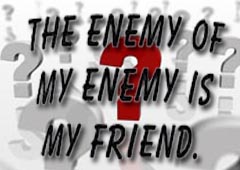 enemy and the ‘stranger’ has become an organisation, idea, person, book, the internet etc.. The ‘stranger’ is broadly speaking a ‘terrorist’ which is a generic and abstract term which could apply to almost anyone. At current there is no agreed international definition for what constitutes a ‘terrorist’, as many governments decide on a per group or individual basis.
enemy and the ‘stranger’ has become an organisation, idea, person, book, the internet etc.. The ‘stranger’ is broadly speaking a ‘terrorist’ which is a generic and abstract term which could apply to almost anyone. At current there is no agreed international definition for what constitutes a ‘terrorist’, as many governments decide on a per group or individual basis.
This week saw two separate but equally important events which cut’s to the core of this debate. The first important event is the ruling of the European court of human rights ruling, that Abu Hamza Al-Masri should be extradited to the United States. Abu Hamza stands accused of trying to set up a terrorist training camp in rural Oregon in the United States. His legal team have been fighting against the extradition proceeding since he was arrested in 2004. The Governments of the United States and Britain clearly regard Abu Hamza as a ‘terrorist’ although no charges of terrorism have yet been proven. At the minute Abu Hamza is guilty of making inflammatory, racist and anti-Semitic speeches. However, Abu Hamza is perhaps fortunate that he lives in the UK unlike Yemeni based Anwar Al-Aulaqi was killed in a US drone strike. Al-Aulaqi was an American citizen who denounced the US in his speeches but there is no evidence that he was involved in any ‘terrorist’ activity. The reason for his killing is still a mystery however it is known that Al-Anulaqi was on a ‘secret kill list’ that the Obama Administration set up. Since taking office President Obama has along with his national security team preceded over so-called ‘death panels’, in-which decisions about who to kill are made.
The second important event has been the de-listing of the People’s Mujahedin of Iran (MKO or MEK) from the US state department’s terrorism list. The MEK has been on the state department’s list since 1997 for their involvement in a series of bombings during the 1980’s in Iran. The organisation was born in the 1960’s and sought to fuse Marxism and Islam in order to combat the Shah’s regime. After the Islamic revolution in 1979 Ayatollah Khomeini declared them to be an enemy organisation and executed and expelled its members. The MEK took refuge in Iraq and allied itself with Saddam Hussein during the eight-year Iran-Iraq war. Allying themselves with Iraq made the organisation very unpopular in Iran so much so that recruitment dried up. The organisation effectively turned itself into a cult for its remaining members and has been accused by opponents of strange cultist practises which include vowels of celibacy, forceful divorce and odd sexual practises.
The MEK declares itself to be the ‘secular democratic’ opponents to the Islamic regime but their coalition with Saddam Hussein led them to be listed by the state department. American forces targeted the MEK during the 2003 invasion of Iraq for its alliance with the Iraqi dictator. The MEK sent many of its wealthy members to the United States and Europe. Using their wealth the MEK lobbied many high profile US officials and politicians and this led to their recent de-enlistment. Behind closed doors it is alleged that the MEK and the US have been working together for many years as Seymour Hersh reported in 2008, US Special Forces were training MEK members in the United States. There have been previous reports that the Israelis were financing, training and arming the MEK for operations against Iran. It has been reported that the MEK on behalf of Israel is responsible for the assassination of Iranian nuclear scientists. It should be noted that there is no evidence that Iran is currently pursing nuclear weapons according to the US intelligence estimate reports. If Abu Hamza is the case to go by then the suggestion alone that MEK were involved in the assassination of scientist should have left them on the list.
However, this is not the case and the US has turned the MEK from a ‘stranger’ into a ‘cousin’ albeit a long-distant one. The changing status of the MEK opens up serious questions about the definition of ‘terrorist’. The suspicion here is that its only terrorism if you attack or kill Americans or Western not Iranians. By doing this the US increase the on-going tension in the Middle East in general and Iran in-particular. It will make Iran more hostile towards the United States and possibly push the region closer to war.
By Usman Butt – Catch21.co.uk
The so-called Free Syrian Army, the main armed rebel group fighting President Bashar al-Assad’s government, announced that it has set up two battalions called ‘Martyr Saddam Hussein’ in the cities of Idlib and Deir al-Zour in Syria.
In a blatant act of defiance and in a move aimed at provoking the feelings of Kurds in general and Syrian Kurds in particular, the FSA formed the two battalions.
Analysts believe that these acts, which are condemned and seen as worrisome by Kurds and all Syrians, might push the opponents to retract and backtrack on their moves against Bashar Assad’s government.
Naming the FSA battalions after Saddam Hussein was met with overwhelming outrage and condemnation by the Kurds.
Earlier reports also said that the FSA is building a military base for the anti-Iran terrorist Mojahedin-e Khalq Organization (MKO, also known as the MEK, NCR and PMOI) in the bordering areas of Syria and Lebanon.
The announcement was made yesterday by Basam al-Dad, a spokesman of the terrorist Free Syrian Army. Al-Dad claimed that the group wants to enjoy the experiences and combat skills of the MKO in different battle fronts.
The MKO is blacklisted by much of the international community.
Before an overture by the EU, the MKO was on the European Union’s list of terrorist organizations subject to an EU-wide assets freeze. Yet, the MKO puppet leader, Maryam Rajavi, who has residency in France, regularly visited Brussels and despite the ban enjoyed full freedom in Europe.
The MKO is behind a slew of assassinations and bombings inside Iran, a number of EU parliamentarians said in a recent letter in which they slammed a British court decision to remove the MKO from the British terror list. The EU officials also added that the group has no public support within Iran because of their role in helping Saddam Hussein in the Iraqi imposed war on Iran (1980-1988).
Many of the MKO members abandoned the terrorist organization while most of those still remaining in the camp are said to be willing to quit but are under pressure and torture not to do so.
The group, founded in the 1960s, blended elements of Islamism and Stalinism and participated in the overthrow of the US-backed Shah of Iran in 1979. Ahead of the revolution, the MKO conducted attacks and assassinations against both Iranian and Western targets.
The group started assassination of the citizens and officials after the revolution in a bid to take control of the newly established Islamic Republic. It killed several of Iran’s new leaders in the early years after the revolution, including the then President, Mohammad Ali Rajayee, Prime Minister, Mohammad Javad Bahonar and the Judiciary Chief, Mohammad Hossein Beheshti who were killed in bomb attacks by MKO members in 1981.
The group fled to Iraq in 1986, where it was protected by Saddam Hussein and where it helped the Iraqi dictator suppress Shiite and Kurd uprisings in the country.
The terrorist group joined Saddam’s army during the Iraqi imposed war on Iran (1980-1988) and helped Saddam and killed thousands of Iranian civilians and soldiers during the US-backed Iraqi imposed war on Iran.
Iran’s Foreign Ministry Spokesman Ramin Mehman-Parast lambasted the US police and security forces for the Wednesday attack on him and other members of the Iranian delegation to the UN 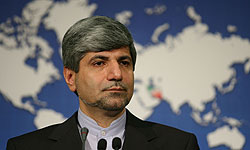 General Assembly meeting, saying that the hosting country must be accountable for the security of foreign diplomats.
General Assembly meeting, saying that the hosting country must be accountable for the security of foreign diplomats.
"Unfortunately we witnessed a form of US police’s indifference to the actions of the terrorist members of the Mojahedin-e Khalq Organization (MKO) and no matter how many times we gestured to the police that they need to stop the attacks of these individuals, they remained apathetic," Mehman-Parast told reporters on the sidelines of the 67th session of the United Nations General Assembly in New York.
Mehman-Parast added that the police only intervened when the attack intensified and later released a statement that the incident had taken place.
The Iranian diplomat pointed out that the host country is responsible for the safety of diplomats and permitting such an incident to occur is not befitting the US as a host.
"It is unfortunate to witness such behavior towards our country and to see the West permitting this terrorist cell continue its activities," Mehman-Parast added.
Mehman-Parast and several other Iranian officials were walking to their hotel when they were surrounded and assaulted by MKO terrorists on Wednesday.
New York City police and the US security forces made no arrests as the attackers physically abused members of the Iranian delegation accompanying Iran’s President Mahmoud Ahmadinejad in his visit to the United States to address the 67th session of the UN General Assembly.
The incident came days after US Secretary of State Hillary Clinton notified Congress that she plans to take MKO (also known as the MEK, PMOI and NCR) off a State Department terror list.
The MKO is blacklisted by much of the international community.
Before an overture by the EU, the MKO was on the European Union’s list of terrorist organizations subject to an EU-wide assets freeze. Yet, the MKO puppet leader, Maryam Rajavi, who has residency in France, regularly visited Brussels and despite the ban enjoyed full freedom in Europe.
The MKO is behind a slew of assassinations and bombings inside Iran, a number of EU parliamentarians said in a recent letter in which they slammed a British court decision to remove the MKO from the British terror list. The EU officials also added that the group has no public support within Iran because of their role in helping Saddam Hussein in the Iraqi imposed war on Iran (1980-1988).
Many of the MKO members abandoned the terrorist organization while most of those still remaining in the camp are said to be willing to quit but are under pressure and torture not to do so.
The group, founded in the 1960s, blended elements of Islamism and Stalinism and participated in the overthrow of the US-backed Shah of Iran in 1979. Ahead of the revolution, the MKO conducted attacks and assassinations against both Iranian and Western targets.
The group started assassination of the citizens and officials after the revolution in a bid to take control of the newly established Islamic Republic. It killed several of Iran’s new leaders in the early years after the revolution, including the then President, Mohammad Ali Rajayee, Prime Minister, Mohammad Javad Bahonar and the Judiciary Chief, Mohammad Hossein Beheshti who were killed in bomb attacks by MKO members in 1981.
The group fled to Iraq in 1986, where it was protected by Saddam Hussein and where it helped the Iraqi dictator suppress Shiite and Kurd uprisings in the country.
The terrorist group joined Saddam’s army during the Iraqi imposed war on Iran (1980-1988) and helped Saddam and killed thousands of Iranian civilians and soldiers during the US-backed Iraqi imposed war on Iran.
